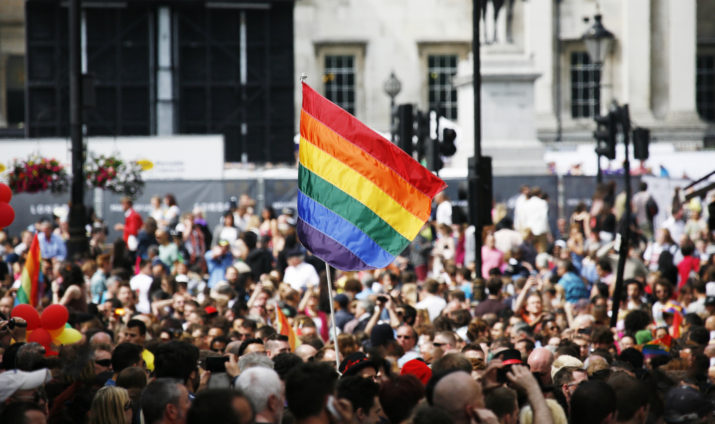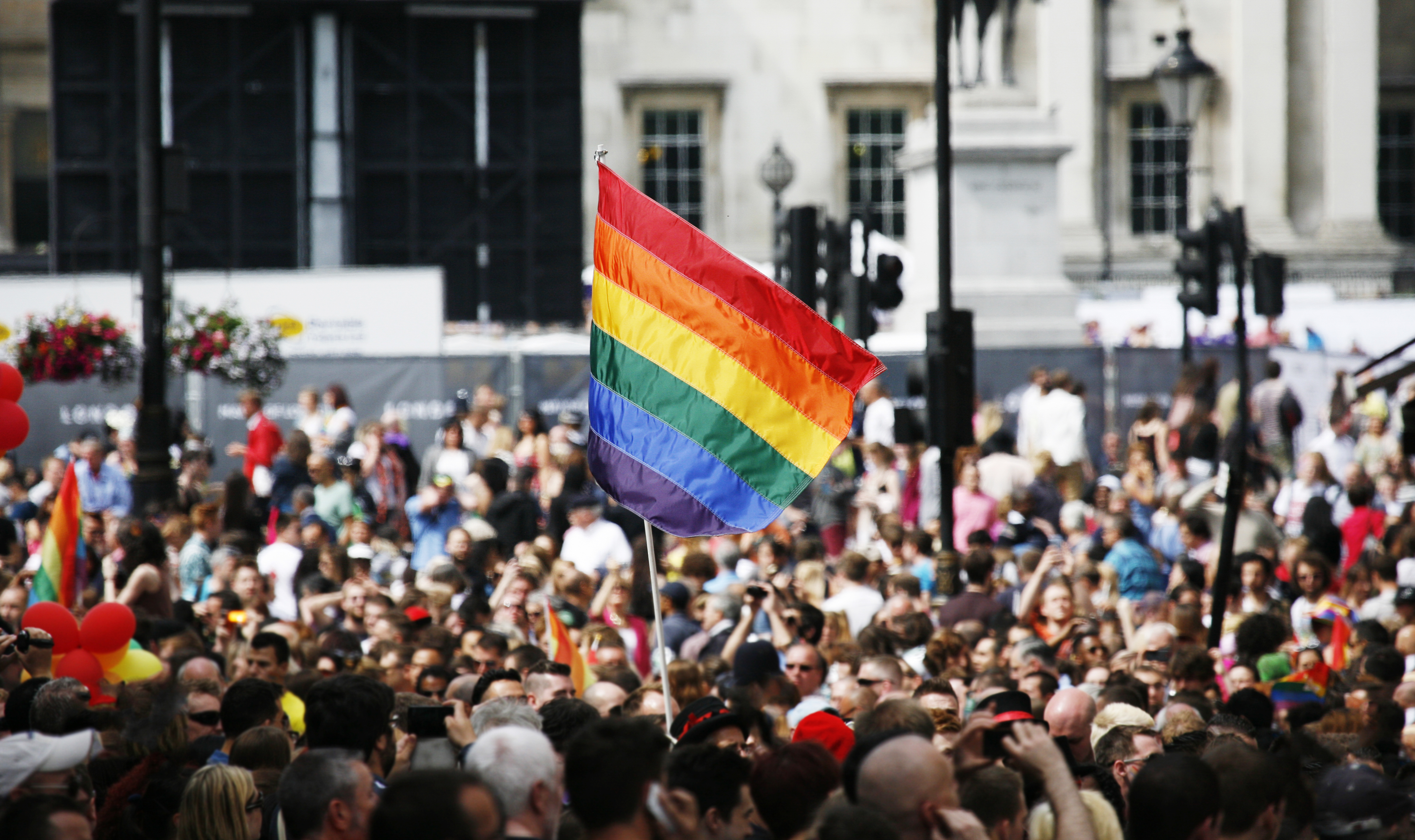

This is part of our special feature The Gender of Power.
The threatening rhetoric right-wing populist (RWP) parties pose to immigrants, Muslims, and other minorities is well-known. If you do not belong to “the people,” then you have reason to fear their policies’ effects if they ever come to power. For example, during the recent French presidential elections, the Front National’s Marie Le Pen stated, “If you come to our country, don’t expect to be taken care of, to be looked after, that your children will be educated without change…playtime is over.”[1] Geert Wilders of the right-wing Party for Freedom (PVV), earlier, this year, argued, “Dutch values are based on Christianity, on Judaism, on humanism. Islam and freedom are not compatible…You see it in almost every country where it dominates. There is a total lack of freedom, civil society, rule of law, middle class; journalists, gays, apostates—they are all in trouble in those places. And we import it.”[2]
Does Geert Wilders’s mention of gay rights imply LGBT people have little to fear from right-wing populism? Are RWP parties actually the LGBT community’s strongest allies? They have not supported LGBT equality, such as same-sex marriage. However, issues about the family are mattering less and less. Instead, as homosexuality has become accepted by wider segments of a country’s population, some right-wing populists (RWP) see the LGBT community most threatened by the “outsiders.” Other RWP parties see them as an actual foe to the people or nation, fomenting violence. The variation we see in RWP parties’ views of the LGBT community and how they change over time need to be considered as LGBT activists formulate their responses to protect or advance their human rights.
Right-wing populism is often seen as a direct response to the counter-cultural revolution of the 1960s and 1970s in Europe. During this cultural revolution, the personal became political. Gay and lesbian social movements played a crucial role in that revolution. By “coming out” in multiple ways, LGBT social movements challenged traditional social hierarchies and gender norms. When national governments refused to change their policies, they created transnational alliances and worked with supranational organizations to impose policy changes from above, such as the passage of the EU’s Equality in Employment Directive,which gave employees protection from sexual orientation discrimination for the first time in Germany and other EU member states. In just a couple of decades, an incredible amount of legislation was passed in a relatively short amount of time.
RWP parties are often perceived as part of the counter counter-cultural movement. They favor traditional forms of authority, patriarchal family structures, and have conservative attitudes towards sexual relations. They believe that one’s identity based on sexual orientation introduces individualism that undermines the people’s solidarity. Right-wing populists tend to conceptualize homosexuality not so much as something against religious doctrine, but as an unnatural, corrupting force on society and the family. LGBT activist organizations act as special interest groups, unaccountable to the people, and collude with international institutions, such as the European Union, to impose laws and sanction governments that undermine national sovereignty by contradicting a nation’s innate and long-held cultural values.
Surveys of RWP party programs, campaign speeches, and political rhetoric of right-wing populist parties bear this out.[3] With the exception of the PVV, right-wing populist parties have always voted against same-sex partnerships. They idolize the nuclear family, are against joint adoption of children by same-sex couples, and for preventing equal access to the medical reproductive benefits available to heterosexual couples. More extreme right-wing populists aim to remove homosexuality from the public sphere entirely, even criminalize it. For example, in 2012 a legislative deputy from the Hungarian Jobbik Party proposed an “anti-gay propaganda law” that would ban advertisements and programs that “promoted sexual deviancy,” implying homosexuality.
However, conservative views of the family and same-sex relations are no longer the most salient issue with regard to how some RWP parties deal with LGBT rights. What we observe over the past ten years is an almost complete and explicit shift away from issues of marriage and family, to the threat the LGBT community is now under from others among some rightwing populist parties in Western Europe. Because homosexuality and equal treatment for gays and lesbians are more socially acceptable, RWP parties in Western Europe try to avoid appearing as unacceptable or outside the mainstream. They de-emphasize their past or current opposition to equal rights and, instead, try to frame the LGBT community as particularly under threat from the same forces as the rest of the nation. The transition in their ideology happens faster as more laws are adopted that grant the LGBT community equal treatment.
In most Western European countries, homosexuality has become accepted by larger shares of the national population. According to the European Social Survey in 1990, a plurality of respondents in every country viewed homosexuality as never justified with the exception of the Netherlands. In 2008, the same survey showed a plurality responded that it was always justified with the exception of Greece and Malta. With growing levels of secularism, fewer people follow traditional church teachings that consider homosexuality as sinful and against nature. For example, weekly mass attendance declined in Ireland from 91 perecent in 1972 to 35 percent in 2012, which is correlated with more accepting attitudes towards homosexuality and approval of same-sex marriage in Ireland.
Similar to failed efforts to reform the welfare state, more pro-LGBT legislation leads to increasing returns, stronger constituencies, and changing public opinion, all of which makes their repeal ever more difficult. For example, Denmark was the first country to create same-sex civil unions in 1989, but excluded the adoption of children by same-sex couples and equal access to in vitro fertilization treatments. Only a few years later was legislation passed to remove these exclusions. When same-sex civil unions were passed in Germany in 2001, same-sex couples were still excluded from many of the benefits heterosexual couples enjoy. Successive rulings by the German Constitutional Court led to more equal treatment. The adoption of same-sex partnership laws increases public support both nationally and transnationally as the myths about the harms it poses to the family are dismissed. In Germany, a 2006 Eurobarometer poll reported that only 52 percent of Germans supported same-sex marriage. In 2015, after at least ten other countries adopted same-sex marriage laws, a 2015 poll reported approval of same-sex marriage at 66 percent, while another poll conducted in 2017 finds it stands at 75 percent.
In response to both changing public opinion and the inability to remove LGBT legislation once in place, some RWP parties reframe the acceptance of homosexuality as what it means to belong to the “liberal nation.” The combination of liberal values and the “mainstreaming” of gay identity creates, what Jasbir Paur termed, “homonationalism.”[4] Homonationalism posits that being part of the liberal nation requires acceptance of homosexuality. Therefore, contrary to how right-wing populism is often culturally defined, nontraditional sexual mores and same-sex partnerships actually define what it means to be modern, civilized, and European, according to right-wing populism. A clear line is drawn between communities or identities that right-wing populists assume still consider homosexuality as deviant. On side of that line is the liberal nation and on the other, usually, is Islam. By creating this Manichean world, right-wing populists can pull the LGBT community to its side as the strongest supporters of the LGBT community against its greatest threat.
The Party for Freedom in the Netherlands is a well-documented case of a party including gay rights into what it means to belong to the “liberal nation.” Yet, the PVV is not unique. In fact, more RWP parties are adopting the PVV’s positions on LGBT rights. For example, no member of the then-Vlaams Blok voted for same-sex civil unions in 1998 or for same-sex marriage in 2003. But, in 2014, Filip Dewinter, a leading figure in the now-Vlaams Belang, stated that if the gay marriage law was up for a vote again, the Vlaams Belang (VB) would be for it. Vlaam Belang’s current leader, Tom van Grieken, instead identified immigrants who had not “fully integrated” and accepted liberal democratic values as the main threat to the LGBT community. Similarly, the entire Danish People’s Party (DF) voted against same-sex marriage in 2012. They also still hold conservative views of what the ideal family structure is. But these ideas are explicitly downplayed. Instead, they emphasize how “Islamic fundamentalists” threaten the gay and lesbian community. In their party program, they point out that the financial penalties for hate speech and crimes should be increased, a not-so-subtle reference to protecting the LGBT community from “religious fanatics.” In Sweden, the right-wing Swedish Democrats (SD) also have traditionally conservative views of what types of families are best for raising children, but make it explicit not to condemn children raised by same-sex couples. Instead, immigrants and Muslims who are assumed not to have accepted “liberal values,” such as tolerating homosexuality, are the real threat. Right-wing populists parties perceive themselves as the legitimate protectors of the LGBT community. For instance, during a Gay Pride parade organized by the LGBT community, the members of the Swedish Democrats led a “Pride march” through a predominantly immigrant suburb of Stockholm, chanting “No homo-haters on our streets,” to assign the real threat to LGBT rights to immigrants and Muslims rather than their own policy agenda favoring the nuclear family.
The Front National (FN) is an example of a right-wing party in ideological transition. When same-sex marriage, known as the Taubira Law, was passed, the FN was completely opposed. At the same time, support for same-sex marriage in France is relatively lukewarm, averaging around 65 percent. In contrast to other countries, massive protests erupted across France, led by the La Manif Pour Tous, after the law’s passage. The legislation still excluded same-sex couples from some of the same benefits heterosexual married couples enjoyed. Later, same-sex couples were allowed to jointly adopt children through a ruling by the Court of Cassation, but lesbians were not permitted public resources for IVF treatment. Levels of acceptance of the LGBT community were relatively low and the legislative record comparatively thin in France.
Open homophobia was also tolerated within the party. Marion Maréchal-Le Pen, Marine Le Pen’s niece and Deputy from Vaucluse, stated same-sex marriage opened the path towards polygamy. Marine Le Pen later stated that the FN was for “enhanced” civil unions and the repeal of the Taubira Law and would apply it retroactively. They also saw an electoral advantage to being firmly against same-sex marriage when Les Républicains split over whether to support SSM during the process of nominating Francois Fillon over Nicolas Sarkozy before the recent presidential election.
At the same time, other FN members worked to downplay their opposition to gay rights and make the LGBT community an ally instead. Gaëtan Dussausaye, head of the FN’s youth wing, argued that the Front National would start putting the issue of SSM “into the background.” Sébastian Chenu, the founder of GayLib and former Socialist, joined the FN and argued that same-sex marriage and gay rights were no longer an important issue for the FN. Instead, immigrants and Muslims are to blame for French society becoming “less free, and when one is gay, one has very much to lose,” if Islamic fundamentalism takes a hold in French areas. Instead, the Front National would define themselves as the defenders of republicanism and “French values,” to which support for LGBT equality was a key condition to belong to the French nation. Some evidence shows that this argument is working even in the LGBT community. One poll showed that support for the FN climbed to 16.5 percent among gay and lesbian respondents in November 2016, compared to 14.5 percent in the general population. Still, factions within the FN and followers of Marion Maréchal-Le Pen object to the prominence of gay men in the party’s leadership and view deemphasizing conservative family values as against the FN’s core principles.
We observe the opposite happening among right-wing populist parties in Central and Eastern Europe. Levels of socioeconomic development are lower in this region than in Western Europe. But arguably, right-wing populist parties are stronger in some post-communist countries than in Western Europe, despite theoretical predictions otherwise, such as lower levels of secularism and less acceptance of homosexuality. They govern alone or in coalition in Poland and Hungary and have a significant presence in other post-communist countries. Most importantly, contrary to mainstream center-right parties in the region, these parties are virulently anti-gay. Opposition to LGBT rights fits within their right-wing populist vision that homosexuals are “outsiders” that threaten national unity. They are corrupting the “people” and collaborate with unaccountable domestic and international elites by bringing foreign ideas that challenge the “people’s” morality.
Tolerance of homosexuality is considerably lower in CEE countries. In a 2008 Eurobarometer poll, a plurality of respondents in every post-communist country felt homosexuality was never justified, with the exception of the Czech Republic. In a similar poll in 2015, in no post-communist country did a majority agree with the statement that there was nothing wrong with same-sex relationships, with the exception of the Czech Republic and Slovenia. There are also fewer laws that protect gays and lesbians from discrimination. Fewer countries have civil unions, with the exception of Poland, the Czech Republic, Hungary, and Slovenia. Constitutional bans on same-sex marriage exist in eleven countries. A majority of citizens in post-communist countries oppose same-sex marriage, again, with the exception of the Czech Republic and Slovenia. Legislatively, only Croatia, the Czech Republic, Estonia, Hungary, and Poland have same-sex civil partnerships.
What differentiates right-wing populist parties from their conservative political competitors is how salient anti-gay rhetoric and policies are. In contrast to Western Europe today, there is a greater partisan divide over LGBT rights among post-communist countries. For instance, leftist coalitions introduced and adopted same-sex civil unions in Poland and the Czech Republic. Mainstream conservative parties oppose LGBT rights, but try to downplay the issue given their usual pro-EU stances, not wishing to appear as anti-European. This leaves the far-right populist parties to represent segments of the society strongly opposed to LGBT rights. Thus, RWP parties take extreme positions, and those positions are often used in their political rhetoric. They argue that homosexuality is against natural law and morally corrupting. For example, Jaroslaw Kaczenski of the Law and Justice Party (PiS) wished to ban gays and lesbians as schoolteachers. Members of the League of Polish Families party depicted gays as pedophiles. The Latvian First Party (LPP) repeatedly denounced homosexuality as a threat to Latvia’s demographic growth.[5]
Like other RWP parties, they are skeptical of international institutions. They perceive the EU and international courts as undermining national sovereignty by importing alien concepts like equal treatment for gays and lesbians. The efforts of international institutions to advance LGBT rights are perceived as a “European” or “Western” conception and agenda that is antithetical to national values. For example, in 2007, the European Court of Human Rights ruled that Warsaw mayor’s ban on an LGBT Equality Parade was illegal under the European Convention of Human Rights. Blowback has taken the form of Poland and Hungary vetoing legislation that would advance LGBT rights across the EU, such as mutual recognition of same-sex civil unions among all member states. They also vetoed the so-called “Horizontal Directive,” which would prohibit discrimination based on sexual orientation in all policy areas, not just private employment, on the grounds the law runs counter to national norms.
Viewing right-wing populist parties in Europe as simply a direct response to left-libertarianism social movements of the 1960s and 1970s ignores how RWP parties treat the issue of LGBT rights differently. We cannot ignore how right-wing populist parties can morph their positions to respond to a changing electorate and legislation. Because right-wing populist parties tend to be issue-based parties, rather than expressions of solid social and economic cleavages, they can easily adopt new positions without much criticism for their hypocrisy. As a result, the LGBT community can be recast from “foe” to “friend.” LGBT activists and their supporters will have to develop strategies in response that take into account the new divisions RWP parties are trying to sow in Western Europe, while taking into account the real dangers RWP parties pose to them in post-communist societies. If evidence from the French case is true, we may expect the LGBT community to become split over the issues of immigration and respect of equal rights for religious minorities among more countries. To perceive the LGBT community as unified and homogenous is always a mistake in the first place. As right-wing populist parties start collaborating more across borders, the transnational networks that bind gays and lesbians across borders could weaken, while national LGBT communities become increasingly divided, creating a hospitable environment for a real rollback in LGBT rights if RWP parties come to power.
Scott Siegel is Assistant Professor of International Relations at San Francisco State University. His research centers on issues related to the European Union, comparative European politics and international political economy. His first book, The Political Economy of Noncompliance (2011), explains why some EU Member States violate international law more than others. His other publications include: Bearing Their Share of the Burden: Europe in Afghanistan (2009) and Weighing Macedonia’s Entry Into NATO (2010).
Photo: Rainbow flag in London’s Gay Pride, Bikeworldtravel | Shutterstock
Published on July 6, 2017.
[1] Marysia Nowak and Becky Branford, “France Elections: What Makes Marine Le Pen Far Right?” BBC.com, February 10, 2017, http://www.bbc.com/news/world-europe-38321401 (accessed June 21, 2017).
[2] Kim Hjelmgaard, “Would-be Dutch PM: Islam Threatens Our Way of Life,” USAToday, February 21, 2017, https://www.usatoday.com/story/news/world/2017/02/21/exclusive-usa-today-interview-with-dutch-anti-islam-politician-geert-wilders/98146112/ (accessed June 21, 2017).
[3] Akkerman, “Gender and the Radical Right in Western Europe.”
[4] Puar, Terrorist Assemblages.
[5] O’Dwyer and Schwartz, “Minority Rights after EU Enlargement.”




